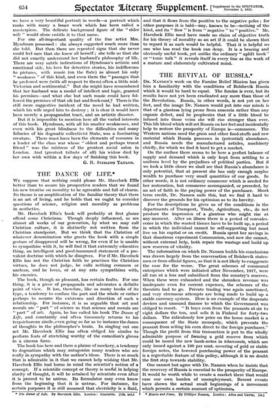THE DANCE OF LIFE.*
WE suppose that nothing could please Mr. Havelock Ellis better than to assure his prospective readers that we found his new treatise on morality to be agreeable and full of charm. Its theme is an amplification of the familiar theory that there is an art of living, and he holds that we ought to consider questions of science, religion and morality as problems in aesthetics.
Mr. Havelock Ellis's book will probably at first glance offend some Christians. Though deeply influenced, as are almost all works of our generation, by what we may call Christian culture, it is distinctly not written from the Christian standpoint. But we think that the Christian of whatever denomination who greets the book with a simple gesture of disapproval will be wrong, for even if he is unable to sympathize with it, he will find it that extremely educative thing, an intelligent and good-humoured statement of a pre- valent doctrine with which he disagrees. For if Mr. Havelock Ellis has not the Christian faith he practises the Christian virtues, he does not judge, he calls nothing common or unclean, and he loves, or at any rate sympathizes with, his enemies.
The book, though so pleasant, has certain faults. For one thing, it is a piece of propaganda and advocates a definite point-of view. It has, therefore, like so many books of its type, a tendency to confuse the part and the whole or rather perhaps to assume the existence and direction of such a relationship. For instance, it is as arguable that art and morals are " part " of science as that science and morals are " part " of art. Again, he has called his book The Dance of Life, and constantly and often tiresomely returns to his terpsichorean simile,even going so far as to instance the dance of thoughts in the philosopher's brain. In singling out one art Mr. Havelock Ellis has often obliged his similes to perform feats of stretching worthy of the comedian's gloves in a cinema farce.
The book has here and there a phrase of mockery, a tendency to dogmatism which may antagonize many readers who are really in sympathy with the author's ideas. There is so much that is admirable in it that we cannot help wishing that Mr. Havelock Ellis had borne in mind the scientist's notion of a concept. If a scientific concept or theory is useful in helping clarity of thought, it will be retained by scientists even after it is proved to be untrue. Its formulator may even know from the beginning that it is untrue. For instance, for certain purposes it is Still assumed that electricity is a fluid, • 2'ho Donee of Life, By Havelock Ellis. London : Constable. ilk, net.' and that it flows from the positive to the negative poles ; for other- purposes it- is held—nay, known to be—nothing of the kind, and its " flow " is from "negative " to "positive." Mr. Havelock Ellis need have made no claim of objective truth for his theory of Morality as an art if it could be shown that to regard it as such would be helpful. That it is helpful no one who has read the book can deny. It is a bracing and obviously useful book, yet unlike the ordinary "uplift book" or "tonic talk" it reveals itself in every line as the work of a mature and elaborately cultivated mind.


























































 Previous page
Previous page